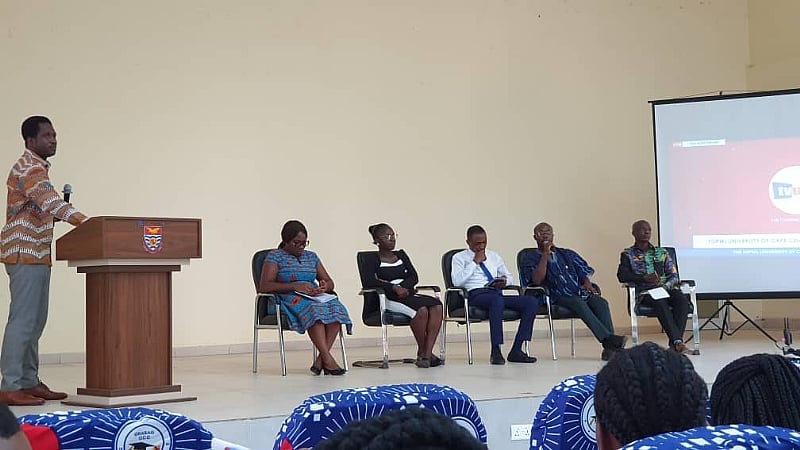The Ghana Academy of Nutrition and Dietetics (GAND), in partnership with SEND GHANA, convened a crucial symposium at the University of Cape Coast (UCC) to address the escalating public health concerns stemming from poor dietary choices. The event, held at the Graduate School Auditorium, focused on the importance of food labelling and its role in empowering consumers to make informed decisions about their nutrition. This initiative is part of a broader effort to develop a comprehensive policy framework on Front-of-Package Warning Labelling and Nutrition Profiling Models (FOPWL) for Ghana, aiming to tackle the growing prevalence of unhealthy diets and their link to non-communicable diseases. The symposium served as a platform to gather student input and further shape the direction of this critical policy.
The symposium brought to light the urgent need for increased awareness and action regarding the consumption of ultra-processed foods. Baaba Sam, a representative from SEND GHANA, highlighted the organization’s advocacy efforts, which center on empowering Ghanaians to distinguish between healthy and unhealthy food options. She stressed the alarming rise in the consumption of ultra-processed foods, rich in sugar, salt, and unhealthy fats, contributing to a surge in obesity and non-communicable diseases. This trend is exacerbated by the affordability, availability, and convenience of these processed foods compared to healthier alternatives like fruits and vegetables. The symposium served as a call to action for attendees to critically examine their own dietary habits and consider the long-term health implications of their food choices.
The health consequences of poor dietary choices were further underscored by Dr. Nana Ama Frimpomaa Agyapong from UCC’s Department of Clinical Nutrition and Dietetics. She presented stark statistics from the World Health Organization (WHO), revealing that non-communicable diseases are the leading cause of death globally, accounting for 75% of non-pandemic-related mortality in 2021. The gravity of this situation is amplified by the fact that many of these deaths occur prematurely, with some individuals succumbing to these diseases before reaching the age of 20. Dr. Agyapong emphasized the direct correlation between the shift towards processed food consumption and the rise in these preventable deaths, reinforcing the urgency of addressing the pervasive influence of unhealthy food options in the Ghanaian market.
The symposium also provided practical guidance on navigating the complexities of food labelling. Mr. J. C. Okyere, Head of Food Safety at the Food and Drugs Authority, offered a detailed explanation of how to effectively interpret food labels. He emphasized the importance of scrutinizing key information such as the product name, country of origin, weight, expiry date, and ingredient list. Armed with this knowledge, consumers can make more informed choices and prioritize their health and well-being. Mr. Okyere stressed the significance of understanding these label components to mitigate potential risks and ensure food safety.
The event concluded with a powerful call to action by Prof. Sebastian Eliason, Dean of the School of Medical Sciences at UCC. Reflecting on a time when Ghanaians primarily consumed natural, locally sourced foods, Prof. Eliason expressed his concern about the current dietary landscape dominated by processed options. He commended the active participation of students and stakeholders in the development of the FOPWL policy and urged them to maintain their engagement to ensure its successful implementation. He emphasized the importance of translating the policy into tangible action, preventing it from becoming another well-intentioned initiative that fails to translate into real-world change.
The symposium served as a vital platform for raising awareness and fostering dialogue about the critical link between food choices and public health. The collaboration between GAND and SEND GHANA highlights a concerted effort to empower individuals with the knowledge and tools to make healthier dietary choices. The insights gathered from the students and stakeholders will contribute to the development of a robust and effective FOPWL policy, aimed at creating a healthier food environment in Ghana and mitigating the rising tide of non-communicable diseases. The event’s focus on education, advocacy, and policy development underscores the commitment to creating a sustainable and impactful change in the nation’s dietary habits.














